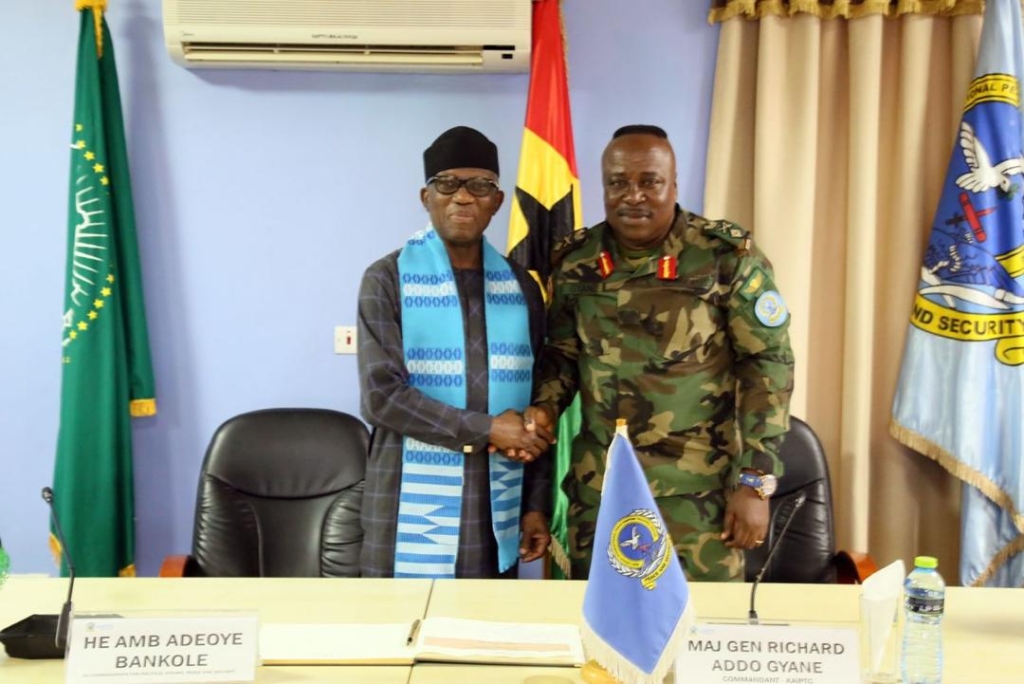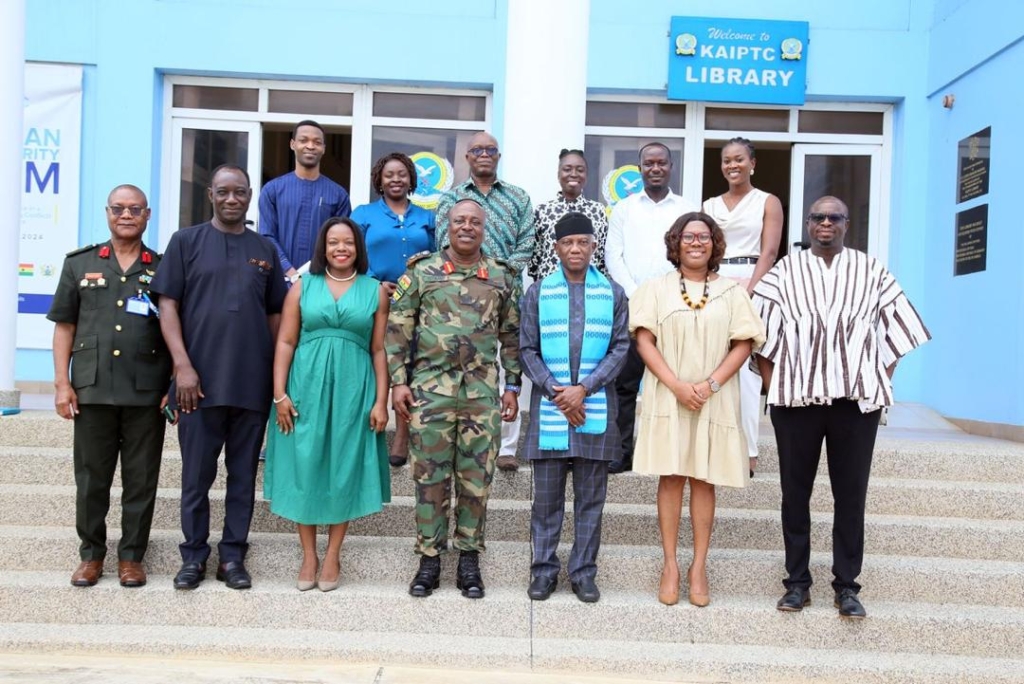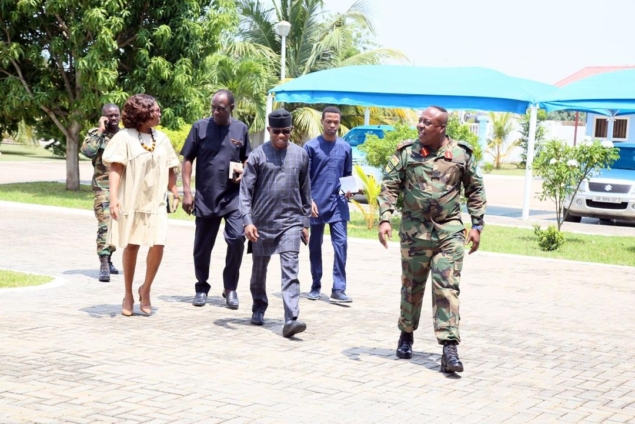The African Union (AU) is directing its focus on new and emerging threats facing the continent, according to its Commissioner for Political Affairs, Peace and Security, Bankole Adeoye.
The Commissioner outlined the new key areas of focus as climate change, artificial intelligence, and the critical need for a functional early warning system, when he visited the Kofi Annan International Peacekeeping Training Centre (KAIPTC) in Accra to apprise himself of the operations of the Centre.
Emphasising the link between climate change and peace and security, Ambassador Adeoye highlighted the need to include peacebuilding discussions within the UN Framework Convention on Climate Change (UNFCCC) agenda, reiterating the AU's commitment to advocating for this critical connection.
He said, whereas there is some resistance in connecting climate change to peace and security on the continent, “We think it is still a very important conversation we must drive,” he said.

Ambassador Adeoye pointed to the devastation caused by Boko Haram in parts of Nigeria, where climate change has exacerbated the conflict.
“In many Boko Haram-affected areas of Nigeria, adults face a stark choice, either join the sect or flee, as livelihoods continue to decline due to the absence of farming activity,” Ambassador Adeoye bewail.
Early Warning System
The Commissioner also acknowledged the challenges in establishing a continental early warning system despite existing structures.
Highlighting a policy paper being developed with by the AU with the support of the UN to address this gap, the Commissioner said the focus on early warning by the AU reflects a commitment to preventing conflicts before they erupt.
"The Sahel situation is a stark reminder that even with warning signs, we haven't always been able to predict crises," the Commissioner said, emphasising the role KAIPTC could play in leveraging its research to push early warnings into concrete preventative actions.

Women, Youth and CSO’s
The Commissioner underscored the importance of women and youth in peace and security efforts, pointing to the low number of females in various positions and the ongoing efforts to get member states to appoint women to leadership roles.
He also said that the AU is introducing the AU Disarmament Fellowship programme as a new initiative aimed at building African expertise in disarmament issues, traditionally led by the international community.
Acknowledging the positive developments in AU election observation missions, with strong support from the European Union, Ambassador Adeoye stressed the crucial role of well-equipped Civil Society Organisations (CSOs) in ensuring credible elections.
Ambassador Adeoye while underscoring the importance of the newly operationalised AU Peace Fund in supporting these efforts, encouraged the KAIPTC to shift away from traditional peacekeeping missions towards more comprehensive peace support operations.
KAIPTC
The Commandant KAIPTC, Major General Richard Addo Gyane, in his remarks, highlighted the Centre's commitment to expanding its reach beyond the ECOWAS sub-region.
He acknowledged the Centre's current focus on the sub-region but emphasised ongoing efforts to broaden impact across Africa, stressing the need for AU support in running mobile training programmes throughout the continent.
Major General Addo Gyane also said that the KAIPTC recognising the importance of youth involvement in peace and security efforts has restructured its Women’s Peace and Security Institute to include the youth.
“Our Youth Unit is engaging the AU to not only support the development of national action plans on youth, peace and security (YPS) for member states that do not have such policies but also to facilitate the implementation of such plans by countries that have them in place”, he said, while expressing the hope that the Commissioner would lend his support towards the process.
The Acting Dean of the Faculty of Research and Academic Affairs of the KAIPTC, Dr. Kwaku Danso, emphasised the Centre's focus on practical applications of early warning systems.
The Centre, he said, collaborates with national actors and stakeholders to enhance conflict prevention efforts across the continent.
Dr Danso also pointed out that many conflicts erupt as micro disputes that escalate into macro conflicts arguing for the crucial role of indigenous conflict prevention frameworks in addressing these issues.
Recognising the value of Indigenous approaches, KAIPTC's existing Course on Conflict Prevention, Dr Danso said includes dedicated components on Indigenous approaches to preventing conflict in Africa.
Latest Stories
-
Liverpool sign Jeremie Frimpong from Leverkusen for £29.5m
13 minutes -
Parliament approves GHS10 billion for National Health Insurance Authority
2 hours -
Mentally challenged person beheads man in Tema
2 hours -
Ghana Digital Centres Limited hosts successful Tech Startup workshop
2 hours -
Ghanaian Policeman secures podium finish at global INTERPOL cyber warfare simulation
2 hours -
Breakthrough cancer drug doubles survival in trial
2 hours -
Government to sanction telcos over poor services
3 hours -
From thirst to triumph: VIMA delivers safe water to forgotten village in Ghana
4 hours -
37 Military Hospital shuts down Emergency Unit for fumigation from June 4
4 hours -
Overhaul or scrap Council of State – CDD-Ghana Research
6 hours -
Abdul-Rasheed Saminu sets new National Record in the men’s 100m, books qualification for Tokyo World Championships
6 hours -
Supreme Court allows Trump to revoke legal status for 500,000 migrants
6 hours -
Eugene Boadi: Bryan Acheampong’s impact on entertainment sector
6 hours -
Faizan Zaki, 13, crowned US National Spelling Bee champion
7 hours -
US to double tariffs on steel and aluminium imports to 50%, Trump says
7 hours

